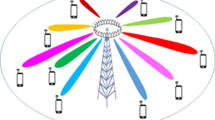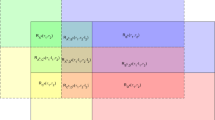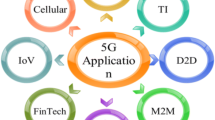Abstract
In 5G wireless communication estimation, of downlink channel with orthogonal frequency division multiplexing (OFDM) integrated with multiple input multiple output (MIMO) is a challenging task. This arises due to the utilization of orthogonal pilots in downlink which leads to pilot overhead. To overcome this challenge spatial-temporal sparsity features with compressive sensing utilized for estimation of channels. However, this leads to the challenge of spatial common sparsity in data transmission due to the overlapping of the antenna group which is not separated. To overcome those challenges, this paper developed a spatial partitioning coalitional game theory (SPCGT) for the MIMO-OFDM downlink channel. The performance of the proposed SPCGT is based on the spectral partitioning of the MIMO antenna array. Within MIMO partitioned antenna game theory is applied for reduction of pilot overhead with improved channel estimation. The proposed SPCGT model is aimed to reduce normalized mean square error (NMSE) and bit error rate (BER) for the estimation of the available channel. The performance of the proposed SPCGT is comparatively examined with the existing techniques in terms of the slow time and fast time varying channels. The NMSE and BER stated that the proposed SPCGT offers reduced NMSE and BER for the MIMO-OFDM system.








Similar content being viewed by others
References
Dai, J., Zho, L., Chang, C., & Xu, W. (2020). Robust Bayesian learning approach for massive MIMO channel estimation. Signal Processing. https://doi.org/10.1016/j.sigpro.2019.107345.
Qiao, G., Song, Q., Ma, L., Sun, Z., & Zhang, J. (2020). Channel prediction based temporal multiple sparse Bayesian learning for channel estimation in fast time-varying underwater acoustic OFDM communications. Signal Processing. https://doi.org/10.1016/j.sigpro.2020.107668.
Shalavi, N., Atashbar, M., & Feghhi, M.M. (2020). Downlink channel estimation of FDD based massive MIMO using spatial partial-common sparsity modeling. Physical Communication, 42, 101138.
Pasangi, P., Atashbar, M., & Feghhi, M. M. (2020). Blind downlink channel estimation of multi-user multi-cell massive MIMO system in the presence of the pilot contamination. AEU-International Journal of Electronics and Communications. https://doi.org/10.1016/j.aeue.2020.153099.
Zhou, J., Yang, A., Guo, P., Zhuang, L., Guo, S., & Qiao, Y. (2020). Experimental estimation of inter-channel nonlinearity power by using differential pilot. Optical Fiber Technology, 58, 102256.
Khan, M., Das, B., & Pati, B. B. (2020). Channel estimation strategies for underwater acoustic (UWA) communication: An overview. Journal of the Franklin Institute, 357, 7229–7265.
Ali, M. S., Li, Y., Chen, S., & Lin, F. (2020). On improved DFT-based low-complexity channel estimation algorithms for LTE-based uplink NB-IoT systems. Computer Communications, 149, 214–224.
Wu, X., Zhu, W. P., & Yan, J. (2019). Channel estimation and tracking with nested sampling for fast-moving users in millimetre-wave communication. Digital Signal Processing, 94, 29–37.
Han, J., Chepuri, S. P., & Leus, G. (2020). Joint channel and Doppler estimation for OSDM underwater acoustic communications. Signal Processing, 170, 107446.
Das, D., & Subadar, R. (2019). Performance analysis of QAM for L-MRC receiver with estimation error over independent Hoyt fading channels. AEU-International Journal of Electronics and Communications, 107, 15–20.
Fatema, N., Hua, G., Xiang, Y., Peng, D., & Natgunanathan, I. (2017). Massive MIMO linear precoding: a survey. IEEE Systems Journal, 12(4), 3920–3931.
Flordelis, J., Rusek, F., Tufvesson, F., Larsson, E. G., & Edfors, O. (2018). Massive MIMO performance—TDD versus FDD: What do measurements say? IEEE Transactions on Wireless Communications, 17(4), 2247–2261.
Shalavi, N., Atashbar, M., & Feghhi, M. M. (2020). Downlink channel estimation of FDD based massive MIMO using spatial partial-common sparsity modeling. Physical Communication, 42, 101138.
Lu, W., Wang, Y., Wen, X., Hua, X., Peng, S., & Zhong, L. (2019). Compressive downlink channel estimation for FDD massive MIMO using weighted $ l_ p $ minimization. IEEE Access, 7, 86964–86978.
Uwaechia, A. N., Mahyuddin, N. M., Ain, M. F., Latiff, N. M. A., & Za’bah, N. F. (2019). Compressed channel estimation for massive MIMO-OFDM systems over doubly selective channels. Physical Communication, 36, 100771.
Kuai, X., Chen, L., Yuan, X., & Liu, A. (2019). Structured turbo compressed sensing for downlink massive MIMO-OFDM channel estimation. IEEE Transactions on Wireless Communications, 18(8), 3813–3826.
Chen, L., Liu, A., & Yuan, X. (2017). Structured turbo compressed sensing for massive MIMO channel estimation using a Markov prior. IEEE Transactions on Vehicular Technology, 67(5), 4635–4639.
Apelfröjd, R., Zirwas, W., & Sternad, M. (2019). Low-overhead cyclic reference signals for channel estimation in FDD massive MIMO. IEEE Transactions on Communications, 67(5), 3279–3291.
Dai, J., Liu, A., & Lau, V. K. (2018). FDD massive MIMO channel estimation with arbitrary 2D-array geometry. IEEE Transactions on Signal Processing, 66(10), 2584–2599.
Choi, J. W., Shim, B., Ding, Y., Rao, B., & Kim, D. I. (2017). Compressed sensing for wireless communications: Useful tips and tricks. IEEE Communications Surveys & Tutorials, 19(3), 1527–1550.
Zhu, F., Wu, N., & Liang, Q. (2017). Channel estimation for massive MIMO with 2-D nested array deployment. Physical Communication, 25, 432–437.
Araújo, D. C., De Almeida, A. L., Da Costa, J. P., & de Sousa, R. T. (2019). Tensor-based channel estimation for massive MIMO-OFDM systems. IEEE Access, 7, 42133–42147.
Lian, L., Liu, A., & Lau, V. K. (2019). Exploiting dynamic sparsity for downlink FDD-massive MIMO channel tracking. IEEE Transactions on Signal Processing, 67(8), 2007–2021.
Wu, S., Ni, Z., Meng, X., & Kuang, L. (2016). Block expectation propagation for downlink channel estimation in massive MIMO systems. IEEE Communications Letters, 20(11), 2225–2228.
Qiao, G., Song, Q., Ma, L., Liu, S., Sun, Z., & Gan, S. (2018). Sparse Bayesian learning for channel estimation in time-varying underwater acoustic OFDM communication. IEEE Access, 6, 56675–56684.
Yin, Y., Liu, S., Qiao, G., Yang, Y., & Yang, Y. (2015). OFDM demodulation using virtual time reversal processing in underwater acoustic communications. Journal of Computational Acoustics, 23(4), 1540011.
Zhou, Y. H., Tong, F., & Zhang, G. Q. (2017). Distributed compressed sensing estimation of underwater acoustic OFDM channel. Applied Acoustics, 117, 160–166.
Qiao, G., Song, Q., Ma, L., Sun, Z., & Zhang, J. (2020). Channel prediction based temporal multiple sparse bayesian learning for channel estimation in fast time-varying underwater acoustic OFDM communications. Signal Processing., 175, 107668. https://doi.org/10.1016/j.sigpro.2020.107668.
Author information
Authors and Affiliations
Corresponding author
Additional information
Publisher's Note
Springer Nature remains neutral with regard to jurisdictional claims in published maps and institutional affiliations.
Rights and permissions
About this article
Cite this article
Dhanasekaran, S., Ramesh, J. Channel estimation using spatial partitioning with coalitional game theory (SPCGT) in wireless communication. Wireless Netw 27, 1887–1899 (2021). https://doi.org/10.1007/s11276-020-02528-4
Accepted:
Published:
Issue Date:
DOI: https://doi.org/10.1007/s11276-020-02528-4




